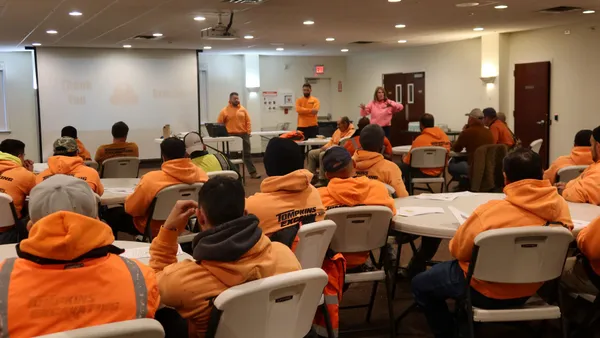Construction companies that don't make trust a high priority within their organizations could be leaving millions of dollars on the table every year, according to a study released by Autodesk and management consultancy FMI Corp. this week.
Authors of the "Trust Matters: The High Cost of Low Trust" found that construction organizations with very high levels of trust within their companies and project teams report better financial and organizational performance, such as more repeat business, increased rates of employee retention and engagement and a higher rate of on-time project delivery than those organizations with lower trust levels.
In a breakdown of how higher levels of trust can generate increased financial benefits for contractors, the companies that have very high levels of trust report that 80% of their projects are for repeat customers. Building relationships with new companies and then onboarding them, according to the study, can cost five times to 25 times more than performing work for existing customers. Companies with high levels of trust can achieve gross margins of 2% to 7% higher than those companies with only above average levels of trust.
Even so, 63% of the study's respondents said their companies had not achieved very high levels of trust.
Using those firms with a high level of trust as an example, construction companies can increase levels of trust by replicating their trust-related attributes, which include creating and maintaining consistent internal processes, ensuring transparency in external and internal communications, fostering an environment in which employees can share their views and placing a priority on employee development.
Identifying high and low levels of trust
So, how do companies know whether they have a high or low level of trust among their employees and with their project partners? For organizations with very high levels, trust is a core company value and is evident throughout all levels of staffing and in all company functions. Firms with above average levels can identify "pockets" of trust within their organizations, but its employees or partners still experience some suspicion of others. A company with average or below average levels of trust could have employees that are not consistently truthful in their dealings within and outside of the organization and might act in their own best interests first.
Trust can be an issue within companies that have expanded across many geographical locations and have a significant number of new hires who haven't had the chance to build relationships, according to the study. To increase levels of trust within these companies, a successful strategy is to treat each regional operation as a company in and of itself. This should make the effort to build trust more manageable.
For all construction companies, according to Jay Bowman, research and analytics lead at FMI, there are ways they can begin increasing the level of trust immediately. First, though, companies need to measure their current levels of trust. This, he said, can be accomplished with a simple employee survey that asks such questions as:
- How do you rate the current level of trust in the organization?
- Do your co-workers always have the best intentions in mind when working together?
- How often are your expectations met by co-workers?
- Do your coworkers quickly respond to questions with, for example, return emails and phone calls?
Then, using that information, Bowman said, organizations should take the first steps to increasing trust by minimizing uncertainty and simplifying how teams collaborate. To minimize uncertainty, he said, companies should:
- Be transparent.
- Ensure roles and responsibilities are well-defined, needed and known.
- Provide ongoing and candid performance feedback.
- Communicate clearly, directly and simply.
- Encourage input from others and create opportunities to share suggestions.
- Be consistent in their processes.
To simplify how teams collaborate, organizations should:
- Make communication easy and transparent.
- Be solutions-focused, not blame-focused.
- Develop informal personal contracts between team members.













